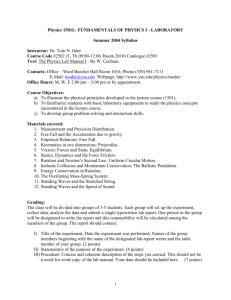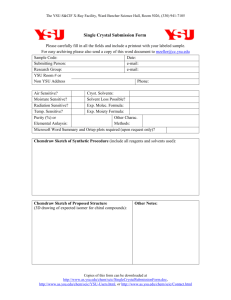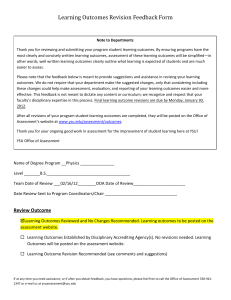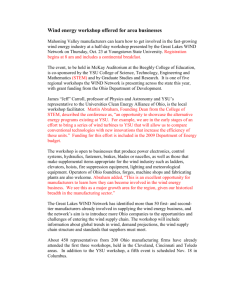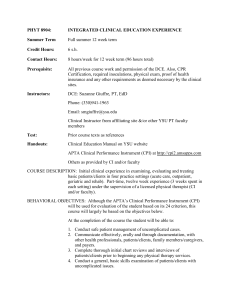3.1 YES Organization – Roles and
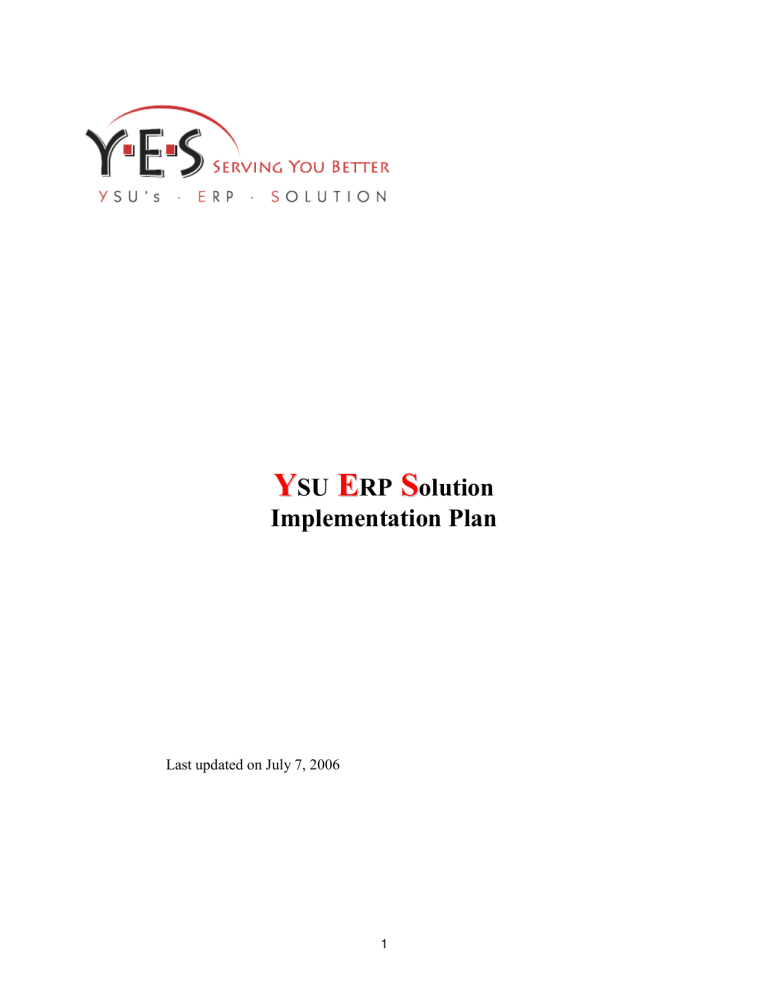
Y
SU
E
RP
S
olution
Implementation Plan
Last updated on July 7, 2006
1
6
TABLE OF CONTENTS
R OLES AND R ESPONSIBILITIES ...................................................... 5
Project Managers (50-75% Time) .................................................................. 6
Advisory Committee (3-5% Time) ................................................................. 6
Implementation Team (10–15% Time) .......................................................... 7
Team Leaders (50-100% Time when module active) ..................................... 7
Core Process Teams (50-75% Time when module active) ............................. 8
3.1.7.2 Human Resources/Payroll Team .................................................. 9
3.1.7.4 Financial Aid Team ...................................................................... 9
3.1.7.5 Advancement Team .................................................................... 10
3.1.9.1 Data Standards Team .................................................................. 10
3.1.9.2 Reporting Team .......................................................................... 11
3.1.10.3 Communications Team ............................................................... 13
......................................................................................... 14
................................................................................................ 15
Perform Reporting Analysis and Develop a Reporting Strategy .................. 17
Conduct the Systems Education ................................................................... 17
4.2.9 Perform System, Integrated and Stress Testing ............................................ 19
DOCUMENT HISTORY………………………………………………………..……………..22
6.1 Document History……………………………………………………………………...22
2
1 Introduction
The purpose of this document is to provide the YES Project structure for the implementation of the
SUNGARD SCT Banner solution for the institution including: Finance, Student, Human
Resources/Payroll, Financial Aid, Advancement and the Luminis Product Suite. It is the first in a series of documents to be included in the overall project definition and planning process.
2 Requirements
Resources
Supervisors of the YES Project team members will be required to adjust departmental workloads by re-distributing key tasks, authorizing overtime, and eliminating non-critical functions during implementation. Since current operational resources are already limited, open dialogue among supervisors, participants and unions will be crucial to the successful redeployment of existing resources.
Resource requirements critical to successful implementation (e.g., budget, facilities, people, and supplies) will be identified, and project funds will be strategically deployed to augment existing resources.
Ad hoc faculty participation and faculty training are not expected to exceed routine committee and service level expectations.
Priority
The YES Project implementation will take first priority over other job responsibilities for the
Implementation Team.
The YES Project implementation will take first priority over other projects that might impact the project schedule and resources.
Governance
Senior management will be supportive and committed to the deployment and implementation of Banner and Luminis, and to the business process redesign necessary to achieve its stated objectives.
Project scope will be closely monitored and controlled. With the implementation of a “vanilla” solution (no modifications), a formal change process will govern changes to scope/budgets and will require Executive Committee approval before proceeding with any changes.
Issue/problem resolution will occur in a timely manner in order to achieve the project timeline and stay within project budget.
Decision-making will be delegated to the lowest level possible in teams with due consultation.
Training
Comprehensive and timely skill set development and training facilities will be provided and sustained throughout the duration of the project.
Internal trainers (train the trainers) will be identified to develop and conduct training.
Staff and faculty will be granted the necessary time to participate in training and perform follow-up implementation activities.
3
3 YES Organization Structure
The following chart outlines the organizational structure for the YES Project. Following the chart is a brief description of each team/committee’s role and function as well as a listing of proposed membership. Other personnel will be involved on an ad hoc basis to provide specific insights, knowledge or support as the project moves through its different phases.
Project Organization
4
3.1
YES Organization – Roles and Responsibilities
The teams and committees will be composed of staff, faculty, students, and management. They will work from a constituent-centered view to ensure that the Banner solution is integrated with other institutional software applications in a timely and cost-effective manner. All team and committee members should possess:
detailed functional knowledge of specific business processes
the ability to work as a team and interact to accomplish specific tasks
the ability to make decisions by consensus
the ability to work well under pressure and in a professional manner
the ability to listen and value input from all participants
commitment to clear, shared goals
3.1.1
Executive Committee (3-5% Time)
The Executive Committee will be responsible for guiding the project implementation from an institutional point of view. The Executive Committee will:
Review progress reports and provide institutional guidance and direction
Address escalated institutional policy and implementation issues in a timely manner
Monitor and approve staffing and training expenditures
Approve requests for modifications to the “vanilla” system
Generally meet monthly
Area of Representation Name Phone Email Address
Academic Affairs
Student Affairs
Robert Herbert
Cyndy Anderson
3103
3532 rkherbert@ysu.edu ceanderson@ysu.edu
Administration
Development & Public Relations
Information Technology Services
John Habat
George McCloud
Donna Esterly
3349
3625
4717 jlhabat@ysu.edu gemccloud@ysu.edu djesterly@ysu.edu
Intercollegiate Athletics
General Counsel
President’s Office
Ron Strollo
Holly Jacobs
Tom Maraffa
2385
2340
2940 rastrollo@ysu.edu hajacobs@ysu.edu tamaraffa@ysu.edu
3.1.2
Project Sponsor (10-20% Time)
The Project Sponsor will work with the vendors to resolve issues that require executive support. As a member of the Executive Committee, the Project Sponsor will champion the project and will:
Provide leadership over the development of realistic budgets, resources and timetables
Approve project goals and deliverables
Serve as signature authority for project expenditures o Monitor and approve routine project expenditures o Recommend staffing and training expenditures for Executive Committee approval
Be accessible to provide guidance, encouragement, feedback, and assistance in addressing obstacles
Role or Area of Representation Name Phone Email Address
Project Sponsor Donna Esterly 4717 djesterly@ysu.edu
5
Assistant Sponsor Rick Marsico 3767 rick@ysu.edu
3.1.3
Project Managers (50-75% Time)
The Project Managers will manage all project related activities and, with the Implementation Team
(described below), are responsible for a successful implementation. The Project Managers are responsible for completing the project on time, within budget, and according to specifications. The
Project Managers will co-chair the Implementation Team and are a resource to the Executive and
Advisory Committees. The Project Managers will:
Coordinate activities with the SCT Project Manager, Project Sponsor, Implementation Team, and all core teams
Review project expenditures and alert Project Sponsor of potential issues
Manage project scope, plans and schedules
Escalate unresolved policy, operational issues and change requests to the Executive Committee through the Project Sponsor
Lead the Implementation Team, providing direction, support and conflict resolution
Provide progress reports (at least monthly) to the Executive and Advisory Committees and weekly status reports to the Project Sponsor
Role or Area of Representation Name Phone Email Address
Project Manager – Functional Eileen Greaf 3510 egreaf@ysu.edu
Project Manager – Technical Carol Chen 2384 cchen02@ysu.edu
3.1.4
Advisory Committee (3-5% Time)
The Advisory Committee provides senior leadership to the project. Membership includes senior administrators, faculty and student representation. The Advisory Committee will provide an avenue for senior management and the University community to influence the project and serve as a resource to the project managers. The Advisory Committee will:
Provide input and feedback to the Implementation Team through the Project Managers
Review progress reports (at least monthly) and identify potential issues from area perspectives
Serve as an additional communication conduit to the University community
Generally meet monthly
Role or Area of Representation Name Phone Email Address
Project Manager – Functional Eileen Greaf 3510 egreaf@ysu.edu
Project Manager – Technical
Technical Advisor
Student Affairs
Administration
President’s Office
Academic Affairs
Carol Chen
Rick Marsico
Jonelle Beatrice
Bill Countryman
Jack Fahey
Cindy Miller
John Hyden
Beth Kushner
Holly Jacobs
Tom Maraffa
Dan O’Connell
Bege Bowers
Ron Chordas
6
2384
3767
1450
3178
1404
7133
3235
1938
2340
2940
7254
1560
4628 cchen02@ysu.edu rick@ysu.edu jabeatrice@ysu.edu whcountryman@ysu.edu jpfahey@ysu.edu cdmiller01@ysu.edu jphyden@ysu.edu bakushner@ysu.edu hajacobs@ysu.edu tamaraffa@ysu.edu djoconnell@ysu.edu bkbowers@ysu.edu rkchordas@ysu.edu
Role or Area of Representation Name
Cynthia Hirtzel
Peter Kasvinsky
Academic Senate
Library
Bob Hogue
Paul Kobulnicky
Student Advisement Terry Fullum
Marketing & Communications Walt Ulbricht
Metro College Bill Beisel
ACE
Ad hoc Faculty
Ad hoc Students
Chris Domhoff
Dr. Alina Lazar
Robert McGovern
Phone
3009
3091
1775
3676
Email Address cshirtzel@ysu.edu pjkasvinsky@ysu.edu bobhogue@cis.ysu.edu pjkobulnicky@ysu.edu
3347
3518 tafullum@ysu.edu wlulbricht@ysu.edu
965-5800 whbeisel@ysu.edu
965-3609 domhoffc@ohea.org
2981 alazar@ysu.edu
3591 rfmcgovern@ysu.edu
3.1.5
Implementation Team (10–15% Time)
The Implementation Team, a cross functional team, will consist of the Team Leaders from each of the core teams who will be active throughout implementation. The team will meet to discuss progress, schedules, process decisions, issues, etc. Written core team status reports will be reviewed. The
Implementation Team will:
Coordinate and resolve issues across core teams
Recommend priorities for allocation of resources
Elevate institutional policy decisions outside of the Implementation Team structure authority to the Executive Committee
Identify products needed by areas outside of the project team to support project deliverables
Expedite decisions and issue directions to core teams
Review change requests to be presented to the Executive Committee
Generally meet weekly and prepare progress reports
Role or Area of Representation Name Phone Email Address
Project Manager – Functional Eileen Greaf 3510 egreaf@ysu.edu
Project Manager – Technical
Technical Advisor
Carol Chen
Rick Marsico
2384 cchen02@ysu.edu
3767 rjmarsico@ysu.edu
Finance Team Leader Mary Lou Castner 1716
Human Resources/Payroll Team Leader Cindy Miller 7133 cdmiller01@ysu.edu
Student Team Leader
Financial Aid Team Leader
Advancement Team Leader
Luminis Team Leader
Jeanne Herman
Jamie Stanger
Catherine Cala
Bob Tupaj
2349
2319
2752
3220 jmherman@ysu.edu jnstanger@ysu.edu cacala@ysu.edu rtupaj@ysu.edu
Technical Team Leader
Communication Team Leader
Troy Cross
Betty Jo Licata
Data Standards & Reporting Team Leader Becky Geltz
Training Team Leader
Associate Director for Application
Systems
Donna Wainio
Dona Madacsi
1697 tacross@ysu.edu
2757 bjlicata@ysu.edu
3053 rlgeltz@ysu.edu
1425 djwainio@ysu.edu
3207 dmmadacsi@ysu.edu
3.1.6
Team Leaders (50-100% Time when module active)
Team Leaders will each manage a core team and are responsible for their area’s implementation in conjunction with an SCT project consultant. The Team Leaders will:
7
Manage the project area and all component parts
Focus efforts of the team
Ensure project tasks are completed by target dates
Monitor, develop and provide updates to project plans and schedules
Facilitate training and consulting
Elevate requests for additional resources to the Project Managers
Determine, with the Implementation Team, escalation of problems, issues and change requests to the Executive Committee
Facilitate and negotiate resolution of critical business issues
Manage scope of project and record changes to scope
Submit weekly team status reports to the Implementation Team
3.1.7
Core Process Teams (50-75% Time when module active)
The Core Process Teams represent each functional system. Each Core Process Team is the primary liaison among all groups involved and will include representation of non-implementation personnel where appropriate. The Core Process Teams make decisions related to the implementation in their functional areas. The Core Process Team members will:
Develop work plans and complete tasks as assigned by the Team Leader
Attend all training classes
Attend the Business Process Analyses and develop an operations analysis document including work flows, input forms, output forms and reports
Adapt YSU business processes to Banner software
Formulate and document policy and or system changes
Define and test user procedures
Develop Policy and Procedures Manuals in accordance with agreed upon standards
Assist in the definition and design of the conversion plan and strategy
Validate converted data
Form and lead functional work teams as needed and assign tasks and responsibilities
Provide research support for issue/problem resolution as directed by the Team Leader
Generally meet weekly and provide weekly status reports to the Implementation Team
3.1.7.1
Finance Team
Role or Area of Representation
Team Leader
Accounts Payable
General Accounting
Materials Management
Budget
Non-Student Accounts Receivable
Application Support
Name Phone Email Address
Mary Lou Castner 1716
Lois Catheline
Elaine Beatty
Katrena Davidson
Lisa Croyle
Akhande Khan
1710
3193
1712
1919
3394 lacatheline@ysu.edu ecbeatty@ysu.edu katrena.davidson@ysu.edu lacroyle@ysu.edu askhan@ysu.edu
Jan Loychik
Patty Seachman
Bob Defrances
Cindy Bella
Tom Masters
Mary Noble
3164 jloychik@ysu.edu
1713 paseachman@ysu.edu
3141
4621
3005
1422 rjdefrances@ysu.edu crbella@ysu.edu twmasters@ysu.edu manoble@ysu.edu
8
Role or Area of Representation
Ad hoc Faculty
Name
Fran Wolf
Ad hoc Graduate Studies & Research Tina Weintz
Ad hoc Students Bob McGovern
3.1.7.2
Human Resources/Payroll Core Team
The core modules that must be installed are Biographic/Demographic, Compensation,
Benefits/Deductions and Payroll. Position Control is the only optional module that will be implemented at the same time as the core modules. The other modules will be implemented on their own time frames after the core modules go live.
Role or Area of Representation
Co-Team Leader
Name
Cindy Miller
Phone Email Address
7133 Cdmiller01@ysu.edu
Co-Team Leader
Compensation
Payroll
Mary Jo Repasky
Sue Lewis
Ron Granger
Maureen Yambar
1583
3471
1922
2355 mrepasky@ysu.edu smlewis@ysu.edu regranger@ysu.edu
mkyambar@ysu.edu
Benefits
Financial Analyst
Application Support
Ad Hoc Faculty
Evaline Abram-Diroll 3748
Rhonda Adams 1699
Dennis Konik
Mary Noble
Ram Kasuganti
3203
1422
3070 eeabramdiroll@ysu.edu rladams@ysu.edu dmkonik@ysu.edu manoble@ysu.edu rrkasuganti@ysu.edu
3.1.7.3
Student Core Team
Role or Area of Representation Name
Team Leader Jeanne Herman
Admissions – Graduate
Admissions – Undergraduate
Tina Weintz
Sue Davis
Records/Registrar
Housing
Athletics
Bursar
Student Advisement
Degree Audit
Student Affairs
Application Support
Center for Student Progress
Mary Bodnovich
Jack Fahey
Judy Richards
Bob Defrances
Cindy Bella
Jody Patrick
Marie Cullen
Jayne Caputo
Marayamah Hassan
Tom Masters
Jonelle Beatrice
Phone Email Address
7259 wolf1876@yahoo.com
3092 jkweintz@ysu.edu
3593 rfmcgovern@student.ysu.edu
Phone
2349
3092
1657
3173
1404
7208
3141
4621
3324
1518
3708
3037
3005
1450
Email Address jmherman@ysu.edu jkweintz@ysu.edu sedavis@ysu.edu mrbodnovich@ysu.edu jpfahey@ysu.edu
Richards@ysu.edu rjdefrances@ysu.edu crbella@ysu.edu jody.patrick@ysub.ysu.edu mdcullen@ysu.edu jecaputo@ysu.edu mhassan@ysu.edu twmasters@ysu.edu jabeatrice@ysu.edu
3.1.7.4
Financial Aid Core Team
Role or Area of Representation Name
Team Leader
Financial Aid
Jamie Stanger
Beth Bartlett
Cindy Maldonado
9
Phone
2319
3504
3398
Email Address jnstanger@ysu.edu babartlett@ysu.edu cjmaldonado@ysu.edu
Role or Area of Representation Name
Elaine Ruse
JoAnn Sarich
General Accounting
Student Accounts
Theresa Orwell
----
Application Support
Ad hoc Faculty
Ad hoc Graduate Studies &
Research
Tom Masters
Jane Reid
Harmony Ramunno
3.1.7.5
Advancement Team
Role or Area of Representation Name
Team Leader Catherine Cala
Development
Alumni Relations
Pam Balent
Erin DeBernardo
Prospect Management
General Accounting
Application Support
Jill Massas
Barb Greene
Kathy Bouquet
Dennis Konik
Marayamah Hassan
Phone
3399
1661
1707
----
3005
2848
Phone
2752
3688
3497
2757
3384
1706
3203
3037
Email Address eruse@ysu.edu jsarich@ysu.edu tlorwell@ysu.edu
(new staff position) twmasters@ysu.edu jmreid@ysu.edu
Email Address cacala@ysu.edu pjbalent@ysu.edu ebdebernardo@ysu.edu jemassas@ysu.edu bgreene@ysu.edu kabouquet@ysu.edu dmkonik@ysu.edu mhassan@ysu.edu
3.1.8
Work Teams (% Time varies)
Work Teams are “subject matter experts” established as needed to perform specific activities. The
Work Teams are responsible for providing information to the core teams, assisting them in making decisions and recommending solutions. The leader of each Work Team is typically a member of and accountable to the Core Process Team. Some Work Teams are created, perform their responsibilities, and then are disbanded; while others may be present throughout the project. Work Teams are frequently cross-functional, testing new business models with constituents across the institution.
3.1.9
Special Work Teams (% Time varies)
As described above for the Work Teams, Special Work Teams are also cross functional, and are a valuable means to communicate with constituents across the institution and obtain feedback that will help build the enterprise-wide solution. Interaction within the Special Work Teams will begin to introduce and manage incremental change within the institution. The Special Work Teams below have been identified.
3.1.9.1
Data Standards Team
This team will develop rules for correct, accurate, and consistent data for standardized use in all departments. They will also define data fields that will be used campus wide and set rules on the design, construction, and inputting of data fields.
Role or Area of Representation Name Phone Email Address
Team Leader
Administration
Becky Geltz
Ron Williams
3053 rlgeltz@ysu.edu
2771 rlwilliams@ysu.edu
10
Role or Area of Representation
Technical Support
Human Resources
Financial Aid
Financial Services
Registrar/Records
Admissions
Advancement
Academic Affairs
Graduate Studies
Materials Management
Technical Support
Ad hoc Faculty
Name
Jim Hanek
Mike Hrishenko
Mary Jo Repasky
Donna Wainio
Elaine Ruse
Patty Gillis
Mary Bodnovich
Sue Davis
Pam Balent
Bege Bowers
Tina Weintz
Jan Loychik
Phone Email Address
1423 jrhanek@ysu.edu
3520
1583
1425 mshrishenko@ysu.edu mrepasky@ysu.edu djwainio@ysu.edu
3399 eruse@ysu.edu
1995 pmgillis@ysu.edu
3173 mrbodnovich@ysu.edu
1657 sedavis@ysu.edu
3688
1560
3092
3164 pjbalent@ysu.edu bkbowers@ysu.edu jkweintz@ysu.edu jloychik@ysu.edu
Dennis Konik 3203 dmkonik@ysu.edu
Joseph Blankenship 1341 jblanken@cis.ysu.edu
3.1.9.2
Reporting Team
This team will develop a report strategy for the institution. The team will identify the key requirements and match them to a reporting solution. Members will review existing reports for their corresponding areas or interview the appropriate individuals to determine if a report still satisfies the reporting needs.
The team will coordinate the effort of identifying future reporting needs (wish lists) after the analysis is concluded. The team will also determine what will be the best reporting tool(s) for the University needs.
Role or Area of Representation Name Phone Email Address
Team Leader
Administration
Student Affairs
Technical Support
Becky Geltz
Beth Kushner
Ron Williams
Jayne Caputo
Jim Hanek
Mike Hrishenko
3053 rlgeltz@ysu.edu
1938 bakushner@ysu.edu
2771 rlwilliams@ysu.edu
3708 jecaputo@ysu.edu
1423
3520 jrhanek@ysu.edu mshrishenko@ysu.edu
Degree Audit
Human Resources
Financial Aid
Financial Affairs
Marie Cullen
Donna Wainio
Elaine Ruse
Donna James
Shirley Hood
1518
1425
1715 mdcullen@ysu.edu djwainio@ysu.edu
3399 eruse@ysu.edu
1708 dejames@ysu.edu sahood@ysu.edu
Registrar/Records
Admissions
Mary Bodnovich
Sue Davis
3173 mrbodnovich@ysu.edu
1657 sedavis@ysu.edu
Advancement
Academic Affairs
Athletics
Graduate Studies
Institutional Research
Technical Support
Pam Balent
Bege Bowers
Elaine Jacobs
Tina Weintz
Robin Naples
Dennis Konik
3688 pjbalent@ysu.edu
1560 bkbowers@ysu.edu
2282 eajacobs@ysu.edu
3092 jkweintz@ysu.edu
1468 rnaples@ysu.edu
3203 dmkonik@ysu.edu
11
Role or Area of Representation
Ad hoc Faculty
Name Phone Email Address
Joseph Blankenship 1341 jblanken@cis.ysu.edu
3.1.9 Other Core Teams (50-80% Time)
3.1.9.3
Technical Team
The Technical Team oversees the core technology issues of the project, such as hardware platform, operating system, database system issues, data migration, security and interfaces.
Role or Area of Representation
Team Leader
Name
Troy Cross
Phone Email Address
1697 tacross@ysu.edu
Technical Advisor
Project Manager – Technical
Rick Marsico
Carol Chen
3767 rjmarsico@ysu.edu
2384 cchen02@ysu.edu
Associate Dir for Application Systems Dona Madacsi
Database Administrator Kirk Tremayne
Technical Support for Finance
Technical Support for Financial Aid
Mary Noble
Tom Masters
3207
3208
1422
3005 dmmadacsi@ysu.edu kjtremayne@ysu.edu manoble@ysu.edu twmasters@ysu.edu
Technical Support for Student Records Marayamah Hassan 3037 mhassan@ysu.edu
Technical Support for HR/Payroll and
Advancement Dennis Konik 3203 dmkonik@ysu.edu
Database Administrator
System Administrator John Dalbec
Doug Sewell
3761
1695 jpdalbec@ysu.edu dmsewell@ysu.edu
3.1.9.4
MyYSU (Luminis) Core Team
The MyYSU (Luminis) Team will oversee the implementation of the Luminis portal and content management system.
Role or Area of Representation
Team Leader
Name
Bob Tupaj
Phone Email Address
3220 rtupaj@ysu.edu
MyYSU Project Advisor
Technical Leader
System Administrator
Training Team Leader
Registrar/Admissions/Enroll
Mgt/F/A/St Acct Receivables
Faculty/Academic Staff/Graduate
Programs/Institutional Research
Carol Chen
Troy Cross
John Dalbec
Donna Wainio 1425 djwainio@ysu.edu
Jeanne Herman
James Stanger
Sharon Mika
Bob Defrances
Cindy Bella
Barb Jones
Bege Bowers
Sal Sanders
Joe Blankenship
2384
1697
3761
2349
2319
7135
3141
4621
7252
1560
7157
1341 cchen02@ysu.edu tacross@ysu.edu jpdalbec@ysu.edu jmherman@ysu.edu jnstanger@ysu.edu samika@ysu.edu rjdefrances@ysu.edu crbella@ysu.edu sasanders@ysu.edu bkbowers@ysu.edu sasanders@ysu.edu jblanken@cis.ysu.edu
12
Role or Area of Representation
Students
Student Life/Housing/Athletics/Equal
Opportunity and Diversity/Disability
Services
Finance/HR/Misc.
Administration/Legal & Affirmative
Action
IT
Name
Emily Fabrizio
Dave Spatholt
John Vogel
Tysa Egleton
Jack Fahey
Kathy Leeper
Trevor Parks
Maureen Wilson
Shelly Zhu Library
Marketing/Development/Alumni/Events
Management/WYSU-FM
Mike Cervone
Ron Cole
Cindy Helton
Shannon Tirone
Eileen Greaf
President’s Office
Phone Email Address eafabrizio@student.ysu.edu
2055
1404
3560
3192
7166
1797
3285
1585
3497
3510 spacks@gmail.com javogel@student.ysu.edu tmegleton@ysu.edu jpfahey@ysu.edu klleeper@ysu.edu tparks@ysu.edu mwilson01@ysu.edu
1723 xzhu@ysu.edu cervone@wysu.org racole01@ysu.edu
cjhelton@ysu.edu stirone@ysu.edu egreaf@ysu.edu
Mikey
Hancharenko
4715 mickey@cc.ysu.edu
Coreena Casey 3102 cacasey@cc.ysu.edu
3.1.9.5
Communications Team
The Communications Team will maintain the YES website and coordinate communication regarding
YES throughout the University community in its broadest sense.
Role or Area of Representation Name Phone Email Address
Team Leader
Marketing & Communication
Betty Jo Licata
Ron Cole
Walt Ulbricht
2757
3285
3518 bjlicata@ysu.edu racole01@ysu.edu
wlulbricht@ysu.edu
Web support
Ad hoc Faculty
Gayle Magnuson 1698
Fred Owens 1855 glmagnuson@ysu.edu fowens@cc.ysu.edu
3.1.9.6
Training Team
The Training Team will develop a structured plan in support of the train the trainer concept for user training that will be required across the institution. Note that this is not the same as systems education which will be provided by SUNGARD SCT.
Role or Area of Representation Name Phone Email Address
Team Leader
Media
Help Desk
Academic Administrator
Donna Wainio
Mike Hrishenko
Debbie Garchar
Cynthia Hirtzel
1425
3520
1595
3009 djwainio@ysu.edu mshrishenko@ysu.edu ddgarchar@ysu.edu cshirtzel@ysu.edu
Academic Secretary Connie Frisby 3134 clfrisby@ysu.edu
13
3.1.9.7
General Person Team
The General Person Team will address all issues related to Banner General Person module.
Role or Area of Representation Name Phone Email Address
Team Leader
Records/Registrar
HR Team Leader
Financial Aid Team Leader
Jeanne Herman
Mary R. Bodnovich 3173
Cindy Miller
James Stanger
2349
7133
2319 jmherman@ysu.edu mrbodnovich@ysu.edu cdmiller01@ysu.edu jnstanger@ysu.edu
Advancement Team Leader
Finance Team Leader
Application Support
Catherine Cala 2752
Mary Lou Castner 1716
Mary Noble 1422
Tom Masters
Dennis Konik
Marayamah Hassan
3005
3203
3037
Associate Dir for Application Systems Dona Madacsi
Training Team Leader Donna Wainio
Project Manager - Functional
Project Manager – Technical
Student Affairs
Eileen Greaf
Carol Chen
Jayne Caputo
3207
1425
3510
2384
3708
Reporting Team Leader Becky Geltz 3053 cacala@ysu.edu manoble@ysu.edu twmasters@ysu.edu dmkonik@ysu.edu mhassan@ysu.edu dmmadacsi@ysu.edu jdwainio@ysu.edu egreaf@ysu.edu cchen02@ysu.edu jecaputo@ysu.edu rlgeltz@ysu.edu
3.2
SUNGARD SCT Personnel
SUNGARD SCT General Manager: The SUNGARD SCT General Manager has overall responsibility for the institution’s account. Project related issues concerning SUNGARD SCT resources or activities will be forwarded to the General Manager for resolution by the Project Sponsor.
The standard level of contact between the SUNGARD SCT General Manager and the institution will be at the Executive level.
SUNGARD SCT Account Manager: The SUNGARD SCT Account Manager will serve as the primary contact point to SUNGARD SCT. This person will be responsible for overall contract execution and delivery management. The standard level of contact between the SUNGARD SCT
Account Manager and the institution will be with the Project Managers.
SUNGARD SCT Project Manager: The SUNGARD SCT Project Manager will be responsible for the development, delivery and monitoring of the project plan and all associated communication. The standard level of contact between the SUNGARD SCT Project Manager and the institution will be with the Project Managers. The SUNGARD SCT Project Manager will provide status reports in writing to the Project Managers after each onsite visit.
SUNGARD SCT Quality Assurance Analyst: The SUNGARD SCT Quality Assurance Analyst will assist in the development of the Quality Assurance Plan and performing Quality Assurance
Assessments and produce a Quality Assurance Status after each assessment. The standard level of contact between the SUNGARD SCT Quality Assurance Analyst will be with the Project Managers and Project Team level. The SUNGARD SCT Quality Assurance will provide status reports in writing after each Quality Assurance Evaluation.
14
SUNGARD SCT Application and Technical Specialists: Technical and Application specialists will be assigned as needed to the project. Each will have specific application knowledge and be responsible for specific tasks identified by the SUNGARD SCT Account Manager or SUNGARD SCT Project
Manager. Such tasks to include:
Installation review
System education
General consulting
Trip agendas and post trip reports will be produced by these specialists and submitted to the
SUNGARD SCT Project Manager, the institution’s Project Managers, and the appropriate Core
Process Team Leader.
4
4.1
YES Implementation
4.2
Define
Software &
Hardware
Requirements
Define
Training
Needs
Define
Prototype
.
Requirements
Define
Conversion
Requirements
Define
Reporting
Requirements
Definition
Define
BPA
Requirements
Software Implementation Activities
Planning
Develop
BPA Plan
Implementation n
Develop
Installatio
Plan
Develop
Training
Plan
Develop
Configuration
Plan
Develop
Conversion
Plan
Installat n
Analysis
Process
Deploy
Solution
“Go io
Live”
System
Education
End User
Training
Develop
Configuration
Validate
Configuration
Test
Configuration
Conversion
& Int erfaces
Reporting
Develop
Strategy &
Reporting
Plan
Closeout
Evaluate
Implementation
Document Findings
& Issue
Recommendations
Obtain Approvals and Sign off
15
YES Project Approach
This section provides a description of the project approach that will be employed during the implementation activities. The following sections provide a brief description of the major areas.
Implementation
4.2.1
Document Current Business Processes
4.2.3
Perform Reporting Analysis and Develop a Reporting Strategy
4.2.5
Conduct System Education
4.2.7
Configure Business Solution
4.2.9
Perform System, Integrated and Stress Testing
4.2.11
Train End Users
4.2.2
Define Data Standards
4.2.4
Install Software
4.2.6
Design Business Solution
4.2.8
Test & Refine Solution
4.2.10
Execute Data Migration
4.2.12
Deploy the Solution
4.2.1
Document Current Business Processes
After attending the Business Process Analysis (BPA) seminar, each Core Process Team identifies and documents major business processes. The documentation prepared includes a list of what works well and improvement needed. This documentation will be made available to the SUNGARD SCT functional consultant prior to the initial visit for review and environment familiarization.
At completion of the BPA seminar the Core Process Team will:
Document the primary current business practices
Provide additional descriptions of current business processes as needed
Document non-value added steps in each primary current business practice
4.2.2
Define Data Standards
The Data Standards Team will prepare Data Standard guidelines to provide recommendations for establishing measures for the protection, access, and use of the institution’s general person data that is electronically maintained on the Banner system. The guidelines define the responsibilities of users who input and access that data. Departments may have individual guidelines that supplement, but do not replace or supersede these guidelines.
16
4.2.3
Perform Reporting Analysis and Develop a Reporting Strategy
This team will develop a report strategy for the institution. The team will identify the key requirements and match them to a reporting solution. Members will review existing reports for their corresponding areas or interview the appropriate individuals to determine if a report still satisfies the reporting needs.
The team will coordinate the effort of identifying future reporting needs (wish lists) after the analysis is concluded. The team will also determine what will be the best reporting tool(s) for the University needs.
4.2.4
Install Software
SUNGARD SCT and the Core Process Team will jointly develop an installation plan and identify the resources required to execute the operational requirements. SUNGARD SCT staff will first install
Oracle and Banner followed by the installation of corresponding self-service products.
Before installation, a conference call will be scheduled to plan software and hardware installation activities. After all the installation activities are completed, SUNGARD SCT consultants will run a test to ensure that the application software is operational and ready to support the project's activities.
At completion of this activity, SUNGARD SCT will:
Install and test the software
Create “Seed”, Training and Preproduction Instances
4.2.5
Conduct the Systems Education
Systems education is not synonymous with end-user training. The objective of SUNGARD SCT
Systems Education/Training is to provide the necessary training to enable the implementation teams and work team participants to understand Banner features, functions, business rules, processes and setups so that these individuals can design the future business process solution.
At completion of the System Education activity SUNGARD SCT will have:
Prepared a System Education Plan
Delivered training materials
Prepared a training schedule
Prepared Trip Reports
Trained the project teams
At completion of the System Education activity, Core Process Team members will have:
Attended training classes
Completed Assignments
Learned how to operate Banner
4.2.6
Design the Business Solution
During the design activity, all aspects of the business process are considered, including:
Process assumptions and goals
Inputs and outputs (including interfaces)
17
Work steps and flows
Automated and manual processes
Organizational responsibilities
Security requirements
Reporting requirements
Estimated transaction volumes and performance benchmarks
At this time, the Core Process Teams establish foundational data definitions, business rules, and determine if software modifications are needed. Functional and technical specifications for software modifications, baseline enhancements, interfaces, conversions, and the reporting environment are also developed during the design phase. Concurrently, the project team is working with Computer Services to design the technical infrastructure, including hardware, network, and desktop requirements and other aspects of the future technical environment (including Computer Services organizational responsibilities).
4.2.7
Configure the Business Solution
During the configuration or build stage, the solution is implemented in the testing instance in accordance with the solution design documents. Baseline applications are set up, business rules are established, workflows are defined, security and user accounts required for testing are established, the master test data set is defined, data mapping rules are defined, and test data is converted and entered.
In the development instance, coding for software modifications, automated conversion routines, reporting, and other features are performed, unit tests are conducted, and the software is migrated into the testing instance. Owners of the legacy systems and Application Systems are developing code to provide output files in accordance with the interface specifications. The system configuration phase also includes the beginning development of draft policies, procedures, and user guides since testing will assess the reliability and functionality of the entire business process (not just the applications) in a production-like mode.
4.2.8
Test and Refine the Solution
Testing of the individual processes begins after the prototypes have been configured in the system with sufficient data to support transaction testing for each process. This will include processing a defined set of transactions for each process to examine the outcome and to enable the procedures and steps to be fully understood.
As the testing proceeds, the processes will be refined, the procedures identified, refined and documented, individual issues resolved, and modifications tested and installed as available. Users of the systems including all personnel from the functional office will participate in the test to provide an opportunity for their input into the procedures and processes.
Data mapping for transfer of legacy data will continue to be tested and refined as well as the resolution of the institution’s reporting solution and location of historical data and volumes of historical data to be brought forward. The actual outcomes are documented and updated as testing is completed and processes refined throughout the testing phase. The outcomes will be compared to the expected outcomes for the processes. Refined processes or expectations will be developed as needed based on the results of testing.
18
During this phase, demonstrations of the processes may be developed for a variety of groups including the individual Core Process Teams, the Advisory Committee, and other groups. This testing is designed to test the individual processes. It may include testing against other modules as required. Full integrated testing is accommodated in the next phase.
4.2.9
Perform System, Integrated and Stress Testing
Once all solutions, modifications, and extensions have been delivered and tested, system testing can commence to verify that Banner performs as designed with live data.
Integrated testing follows to prove the full interoperability of the system as a whole. All components of the go-live production environment need to be integrated into this testing cycle, as they become available. Toward the end of this cycle performance testing under load (stress and availability testing) will be conducted to produce metrics to aid in tuning the software and hardware for production.
Integrated testing will test all the functionality of each module in an emulated live environment.
During this stage of testing, a representative subset of directly-entered transactions and feeds from external systems using job scheduling routines emulating production will be processed to verify system functionality. Final testing of legacy data mapping and reporting solutions will be conducted throughout this step. Scripts, refined in the prior phase, will be used to determine results in a fully integrated environment and provide for any final refining necessary using data mapped from the legacy systems as much as possible. Interfaces, production schedules and reporting requirements are also tested and final refinements made. Modifications are fully tested, installed, and final testing performed in this segment.
Deployment solutions are finalized and fully tested as well as stress tests to determine likely system performance. Final documentation is prepared and end user training scheduled and communicated.
Any parallel testing required will be completed during the integrated testing mode. Presentations of final processes are developed and submitted to the appropriate groups. Final sign-off by each of the
Core Process Team, the Implementation Team, the Advisory Committee, the Steering Committee and any other pertinent parties is obtained on the final processes.
4.2.10
Execute Data Migration
The data migration process is one of the most complex implementation tasks and it is a critical step to the success of the implementation. To successfully execute the migration activities the institution will:
Determine conversion method. Manual, automatic or a combination of both
Determine the scope of the conversion
Plan conversion activities
Gather conversion requirements
Finalize detailed mapping rules including historical data
Define Data Standards
Populate institution-specific values in validation tables
Extract data from legacy systems and populating appropriate tables
Perform quality assurance on the converted values and resolve exceptions to the conversion rules
SUNGARD SCT Technical consultants will meet with the Data Migration Work Team to:
19
Plan Conversion Activities
Install and provide Data Migration Tool Kit Training
Onsite Data Mapping for each product
Remote or Onsite follow-up support
The Data Migration Work Team is responsible for:
Detailed Conversion Plans
Final mapping rules
Automated conversion facilities
Legacy data converted
Production enterprise server systems on-line
Banner production environment constructed and on-line
4.2.11
Train End Users
The objective for developing an end-user training program is to enable the institution to deliver information about the new system in a manner that is easily understood and quickly assimilated by the target groups.
It is critical that a training plan is developed to set the common expectations around which the training will be completed. The training plan also identifies the various groups that need to be trained, the training curriculum for each group, the mode of training for each piece of the curriculum and the approximate time frame and locations for the training sessions.
The Training Team Leader will develop training materials and will be responsible for conducting the training.
4.2.12
Deploy the Solution
During the deployment stage, the applications are set up and configured in the production mode, software modifications and enhancements are migrated into production, and full converted data sets are loaded. In summary, the institution is ready to begin daily operations using the new system.
5 Timeline
5.1
Timeline
As part of the Project Definition activities an overall timeline will be constructed to identify the high level schedule of the solution. Key factors that should be considered in developing this time line include:
Academic Cycle
Business Priorities
Technical Priorities
Staffing
Major Events
20
Please note that the model includes phased implementation of several of the modules. Experience shows that the planning factor above typically lead to multiple deployments in order to meet the goals and constraints. A brief discussion is in order to explain the difference between a “deployed” date and a “complete” date.
The day when the current system is transitioned to the new system is the “deployed” date. In some instances, a module (i.e. Finance) may have components that are being “deployed” in phases based on their necessity throughout the year. A module is not “complete” until after it has gone through one business or academic cycle.
21
YES Project Timeline
2006 2007 2004 2005 2008
Project Organization & Planning
Finance
Chart of Accounts/Accounts Payable, & Grants Deployed (Jul 2005)
Endowments, Fixed Assets & Budget Deployed (Dec 2005)
Human Resources/Payroll
HR/Payroll Deployed (Jan 2007)
Advancement
Advancement Deployed (Oct 2005)
Advancement SSB Phase I (June, 2006)
TouchNet Payment Gateway Deployed (2006)
Student
Admissions Deployed (Sept 2006)
Student A/R Phase I Deployed (Sept 2006)**
Student A/R Phase II Deployed (Feb 2007)
Registration Deployed (Mar 2007)
Financial Aid
Financial Aid Phase I Deployed (Sept 2006)**
Financial Aid Phase II Deployed (Jan. 29, 2007)
My YSU (Luminis)
My YSU Phase I Deployed (Summer, 2006)
My YSU Phase II (April 2007)
WebFocus Deployed (2006)
ODS Install & Training (2006 - 2007)
EDW (postponed)
Banner 7.0 Upgrade (Dec. 2005)
Banner 7.2 Upgrade (June, 2006)
Campus Loan Manager (Oct 2006)
TouchNet Commerce Mgt (tentative)
FSA ATLAS (tentative)
Workflow (tentative)
Xtender Solution (tentative)
EDI Learning (tentative)
Technical
IBM Hardware Installation
Strategic Reporting Assess
Banner Install
Tech Training (Oracle, PL/SQL)
Toolkit Install & Training
Tech Training (Consulting, Security)
Tech Training (Fin, Adv, Banner Adm)
Tech Training (Web Pgm)
Tech Training (Oracle Backup)
Appworx Install & Training
Tech Training (Object Access)
Luminis Kickoff & Workshop
ODS Install & Training
Tech Training (Student)
Tech Training (Fin Aid)
Tech Training (HR) **Deployed new students for summer and fall of 2007
22
Document History
Revision Record
Page No Date and Sections
2
4
12/1/05, Table of
Contents
12/1/05, section 3
5
6
6
Author
Carol Chen
Carol Chen
12/1/05, section 3.1.1 Carol Chen
3/24/06, section 3.1.3 Carol Chen
6/14/06, section 3.1.4 Carol Chen
7
8
9
9
7/6/06, section 3.1.5
7/6/06, section 3.1.7.1
3/24/06, section 3.1.7.2
7/6/06, section 3.1.7.3
Carol Chen
Carol Chen
Carol Chen
Carol Chen
9
10
11
5/15/06, section 3.1.7.4 Carol Chen
5/24/06, section 3.1.9.1 Carol Chen
3/28/2006, section
3.1.9.2
Carol Chen
12 5/24/06, section 3.1.9.3 Carol Chen
12 & 13 7/6/06, section 3.1.9.4 Carol Chen
13
13
14
20
3/24/06, section 3.1.9.5 Carol Chen
12/1/05, section 3.1.9.6 Carol Chen
7/7/06, section 3.1.9.7 Carol Chen
4/18/06, section 4.2.11 Carol Chen
22
23
24
6/08/06, section 5.1 Carol Chen
12/1/05, section 6.1 Carol Chen
12/13/05, section 3.1.9.3 Carol Chen
Notes
Added Document History
Updated YES Project Organization
Updated Executive Committee
Updated Email Addresses
Updated Advisory Committee
Updated Implementation Team
Updated Finance Team
Updated Email Addresses
Updated Student Core Team
Updated Financial Aid Core Team
Updated Data Standards Team
Updated Reporting Team
Updated Technical Team
Updated MyYSU Team
Updated Email Addresses
Updated Training Team
Updated General Person Team
Updated Training Team Leader
Responsiblity
Updated YES Project Timeline
Added Document History
Updated Technical Team
23
